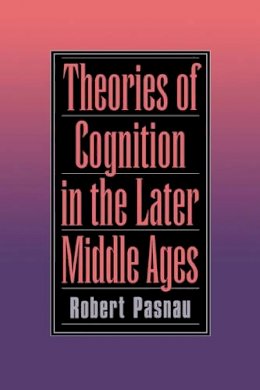

Stock image for illustration purposes only - book cover, edition or condition may vary.
Theories of Cognition in the Later Middle Ages
Robert Pasnau
€ 5.91
FREE Delivery in Ireland
Description for Theories of Cognition in the Later Middle Ages
hardcover. A major contribution to the history of philosophy in the later medieval period (1250-1350). Num Pages: 348 pages, black & white illustrations. BIC Classification: 3H; 3J; HPCB; HPM. Category: (P) Professional & Vocational. Dimension: 237 x 163 x 28. Weight in Grams: 700. Good clean copy with minor shelfwear. DJ has some minor nicks and tears, remains very good
This book is a major contribution to the history of philosophy in the later medieval period (1250–1350). It focuses on cognitive theory, a subject of intense investigation during these years. In fact many of the issues that dominate philosophy of mind and epistemology today - intentionality, mental representation, scepticism, realism - were hotly debated in the later medieval period. The book offers a careful analysis of these debates, primarily through the work of Thomas Aquinas, John Olivi, and William Ockham. Each of these figures attempts to reconceptualise cognition along direct realist lines, criticising in the process the standard Aristotelian account. Though of primary interest to medieval philosophers, the book presupposes no background knowledge of the medieval period, and will therefore interest a broader community of philosophers concerned with the origins of contemporary cognitive theory.
Product Details
Format
Hardback
Publication date
1997
Publisher
Cambridge University Press
Condition
Used, Very Good
Number of Pages
348
Place of Publication
Cambridge, United Kingdom
ISBN
9780521583688
SKU
KSG0034416
Shipping Time
Usually ships in 2 to 4 working days
Ref
99-1
Reviews for Theories of Cognition in the Later Middle Ages
"This is a...sophisticated piece of work,...which well repays the effort put into reading it. Pasnau's knowledge of his subject is deep, and he leads his reader carefully through the same paths as he has taken to achieve this understanding. he brings out well the importance of medieval accounts and their similarities to modern ones.... Highly recommended." Richarrd Cross, Int'l Philosophical Qtrly "...a lively contribution to a philosophical way of discussing thinkers in the Later Middle Ages. This book nicely shows the rationale of the history of Western philosophy continuing as it has." Richard Bosley, Philosophy in Review "Robert Pasnau's book is a welcome addition to the sparse literature on medieval philosophy of cognition." Simon Kemp, Journal of the History of the Behavioral Sciences "Pasnau has written a fascinating, provocative book that should be read by anyone who is interested in medieval philosophy of mind and epistemology." The Philosophical Review "...important and challenging...Pasnau handles his materials, including his own translations, deftly and with philosophical ingenuity. His book is very important, challenging, and should be read by anyone who has an interst in philosophical theories of cognition. He succeeds in leading 'a new historical perspective to contemporary thinking about the mind and knowledge.'" Journal of the History of the Neurosciences
